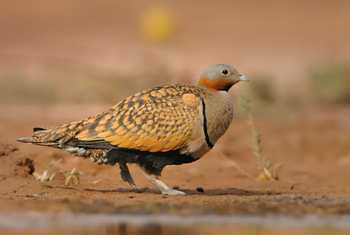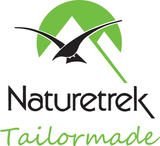Both Richard & Bob were excellent and worked really hard to ensure we saw plenty of birds and generally had a good time. The highlight was definitely seeing Houbara Bustard on five days!
A.R, East Yorkshire, November '23



Tour Itinerary and Reports
Can I help you?
Go Slow in Fuerteventura
Tour Code: ESP60A relaxing 8-day birdwatching holiday to Fuerteventura in the Canary Islands.
£2,295
£1,995
Highlights
Tour Itinerary and Reports
Can I help you?
Quick Enquiry
Summary
Fuerteventura, with a glorious climate and direct flights from around the UK, is the perfect location for a week of ‘Go Slow’ birding. Our 7-night stay on the island is based at a very comfortable rural hotel in the north of the island, within 20km of most of the key locations, resulting in a relaxed pace to the tour and more time in the field to enjoy the birds and other wildlife that we find, work on our ID skills, and with less time spent travelling!
Standing 100 kilometres off the coast of Morocco – and one of the two most easterly islands of this fascinating Atlantic archipelago – Fuerteventura enjoys an interesting and varied avifauna. With its birdlife and climate strongly influenced by neighbouring Africa, it possesses its own endemic bird, the Canary Islands Stonechat, and is now, due to hunting in North Africa, the best place in the world to watch the vulnerable Houbara Bustard strutting across a stony desert plain. In addition, there are three further Macaronesian endemics to enjoy: the widespread and perky Berthelot's Pipit, the more localised Plain Swift, and the emblematic Atlantic Canary. Fuerteventura is a great place to catch up with other specialities, including the charismatic Cream-coloured Courser, Egyptian Vulture, Barbary Falcon, Black-bellied Sandgrouse, African Blue Tit and Trumpeter Finch. Our late autumn and winter visits are timed to give a great chance of interesting migrants – and sometimes rarities, too. Though the range of species is relatively low, with perhaps 50-65 bird species possible during the week, this is more than made up for in quality.
- Enjoy relaxed birding and winter sun in Fuerteventura
- Seven nights at the same very comfortable, charming rural base
- Look for Canary Islands Stonechat and Houbara Bustard
- Berthelot's Pipit, Plain Swift and Atlantic Canary
- Plenty of time to relax and enjoy the hotel pool
- Cream-coloured Courser and Trumpeter Finch give a taste of North Africa
Grading
Grade A - A relaxing holiday with short (and optional) walks with plenty of time for relaxation in the stunning hotel grounds.
Fuerteventura is the perfect location for a week of relaxed birding. Standing 100 kilometres off the coast of Morocco – and one of the two most easterly islands of this fascinating Atlantic archipelago – it enjoys an interesting and varied avifauna. With its birdlife and climate strongly influenced by neighbouring Africa, it possesses its own endemic bird, the Canary Islands Stonechat, and is now, due to hunting in North Africa, the best place in the world to watch the vulnerable Houbara Bustard strutting across a stony desert plain.
There are three further Macaronesian endemics to enjoy: the widespread and perky Berthelot's Pipit, the more localised Plain Swift, and the emblematic Atlantic Canary. Fuerteventura is a great place to catch up with other specialities, including the charismatic Cream-coloured Courser, Egyptian Vulture, Barbary Falcon, Black-bellied Sandgrouse, African Blue Tit and Trumpeter Finch. Our late autumn and winter visits are timed to give a great chance of interesting migrants – and sometimes rarities, too. Though the range of species is relatively low, with perhaps 50-65 bird species possible during the week, this is more than made up for in quality.
Our seven-night stay on the island is based at a very comfortable rural hotel in the north of the island, within 20km of most of the key locations, resulting in a relaxed pace to the tour and more time in the field to really watch the birds carefully and less time in the vehicle!
Amongst rocky slopes of ancient volcanoes and deeply incised stream beds – barrancos – the arid, semi-desert landscape of Fuerteventura is home to the Canary Islands Stonechat, a smart bird only found on this one island. Sometimes elusive, with a bit of local knowledge it can be seen well, as it catches flies along the deep ravines and rocky slopes. Fuerteventura is also a stronghold of the endangered Houbara Bustard – here with its own unique subspecies fuertaventurae (slightly richer in colour and more heavily barred than those in North Africa.) Indeed, the island is nowadays probably the best place in the world to see this fast disappearing species. As we search for these two scarce and very special birds, we’ll come across a range of other desert-dwelling specialists, such as Cream-coloured Courser, Black-bellied Sandgrouse and Trumpeter Finch.
Of the three other Macaronesian endemics, Berthelot’s Pipit is by far the easiest to find, often appearing within the hotel grounds, welcoming you with its cheery call. Plain Swift and Atlantic Canary are more localised and will take a bit more effort to find. Also finding a home on Fuerteventura are Egyptian Vultures (the endemic Canarian form majorensis is known locally as Guirres), North African Raven, Black-bellied Sandgrouse, African Blue Tit, Desert Grey Shrike, Barbary Partridge and a recent colonist in the shape of Laughing Dove. Trumpeter Finch, Lesser Short-toed Lark and Spectacled Warbler are easy to find in the right habitat.
With its rocky coastline, Cory's Shearwaters can be seen cruising past and amongst the waders to be found are Whimbrel and Kentish Plover. Barbary Falcons – nowadays treated as a race of Peregrine Falcon – roam widely and we might be lucky to find them. On Fuerteventura one can also pick up migrants from Europe, Africa or even a trans-Atlantic vagrant or two from North America.
What's Included?
- Flights
- Food:
All food is included, from dinner on Day 1, to breakfast on Day 8.
Reviews
-
-
The leaders knew where best to go, balancing likely viewings with distance, and I came away feeling we had done the Island's content real justice. Richard's comprehensive knowledge and spotting ability were a real boon. I am really pleased to know he's coming to Antarctica and The Arctic, as he was affable, thoughtful of the group, and a good leader. The pace was just right, with time for an afternoon rest.
P.E, Essex, November '23
Dates & Prices
2025

Tour Leader: Simon Woolley
Simon Woolley is a passionate birder and all-round naturalist. Having cut his birding teeth in childhood on the Dee Estuary, he has lived in Hampshire’s New Forest for many years now, and is the author of the definitive book on The Birds of Blashford Lakes. He has travelled extensively on six continents in search of wildlife. He has a particular interest in bird systematics and endemism, and is currently completing a book on the latter topic. He has worked for many years as a Geography teacher, so clients can be assured of lots of geological and climatological background exploration on the tours he leads…. As if any further endorsement of your choice of Naturetrek were needed, he met his wife, Julia, on a Naturetrek tour of Kenya in 1997!
Why Naturetrek?
At Naturetrek we craft expertly-guided group and tailor-made wildlife holidays and cruises to all seven continents. On one of our holidays, you can be assured that our passionate team will enable you to experience and enjoy the best of the world's wildlife and natural spectacles in as comfortable and rewarding a manner as possible, caring as best we can for the environment in the process. We are proud to provide:
- The widest choice of wildlife holidays worldwide
- Tours managed and led by naturalists, for naturalists
- Outstanding value and exceptional customer service
Furthermore, as a Naturetrek client, our office team are always to on hand to help you – so if you have any queries about your holiday, whether before or after you have booked, we will be delighted to answer them on the phone. Please just give our team a call!



 Loading search...
Loading search...


























